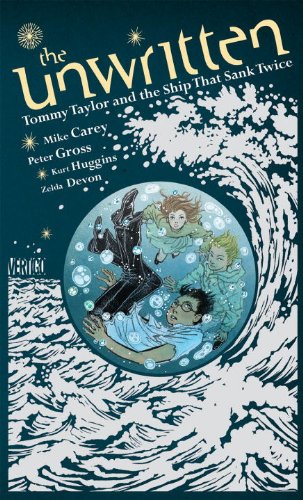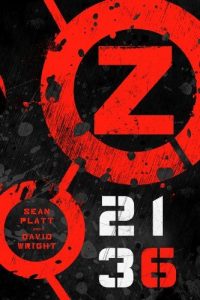 I was poised to read a Robin Hobb book, but then my schedule got pushed back, so I went for something guaranteed to be quick and easy. And then work was a bear[1], and I realized a new Walking Dead was out, so now I’m actually behind on starting the Hobb instead of ahead. Oh well, that’s what happens when I try to keep to a schedule on much of anything besides work and vacations.
I was poised to read a Robin Hobb book, but then my schedule got pushed back, so I went for something guaranteed to be quick and easy. And then work was a bear[1], and I realized a new Walking Dead was out, so now I’m actually behind on starting the Hobb instead of ahead. Oh well, that’s what happens when I try to keep to a schedule on much of anything besides work and vacations.
Which brings us to Shockscape, a book that demonstrates Heisenberg’s uncertainty principle in action[2]. See, these books can only have either a title that is vaguely related to the plot, or a cover that is vaguely related to the plot. Never both, and virtually never more than a vague relationship. In this case, the title is as far as I can tell a meaningless agglomeration of syllables, while the cover shows a giant mutant bear, who isn’t in the book long, but he is the catalyst for the rest of the action. Which consists of the same kind of action in most Deathlands books: the good guys run into a baron[3], he sets them to some task for which failure means death and/or enslavement, depending on whether you are a person on the task or a hostage, the good guys complete the task (probably by killing someone what needed it), and then return and kill the baron too, because what kind of a dick makes people do things whether they want to or not?
It’s a good thing I don’t mind stories that are formulaic, as long as I know that whatever character or plot or world-building development missing from this book will definitely occur in the next one. Anyway, there was a pretty solid cliffhanger? (I hope they don’t resolve it in the easiest way possible, where they might as well not have had it in the first place.)
[1] Oops
[2] It doesn’t.
[3] A baron, in Deathlands parlance, is the leader of some locality. He always has sec men, and usually is in some sense a bad guy, either by virtue of terrorizing his populace or by virtue of opposing the good guys in a non-evil way that is never justifiable enough to make our heroes look like non-good guys when they inevitably chill him in the end. (Unless he’s a recurring character who gets away but will probably be killed in a sequel. That happens.)
 Thing that is awesome: I saw a
Thing that is awesome: I saw a  On Sunday
On Sunday I’ve been reading these Tommy Taylor books long enough to put them on the same level as
I’ve been reading these Tommy Taylor books long enough to put them on the same level as  This is I think the next to last volume in the Star Wars Extended Universe series of books, by chronology. It is also, to my knowledge, the last book written by its author before he died unexpectedly a couple of years post-publication, certainly during the timespan when the EU was being gracelessly removed from Star Wars canon. There’s probably some kind of metaphor there.
This is I think the next to last volume in the Star Wars Extended Universe series of books, by chronology. It is also, to my knowledge, the last book written by its author before he died unexpectedly a couple of years post-publication, certainly during the timespan when the EU was being gracelessly removed from Star Wars canon. There’s probably some kind of metaphor there. The biggest problem with
The biggest problem with  Fun fact: I only saw the Disney animated Beauty and the Beast once, theatrically, 26 years ago. I had the soundtrack CD, so I know it pretty well, but I only ever saw it the one time. (Less fun fact: Twenty six years ago. I was in high school, which is even less fun still.) Between that dimness and the 30+ minutes of new footage, the original live-action
Fun fact: I only saw the Disney animated Beauty and the Beast once, theatrically, 26 years ago. I had the soundtrack CD, so I know it pretty well, but I only ever saw it the one time. (Less fun fact: Twenty six years ago. I was in high school, which is even less fun still.) Between that dimness and the 30+ minutes of new footage, the original live-action  As you have no reason whatsoever to remember, I read the previous two books in this trilogy sometime in the last year or two I guess? And they were perfectly cromulent serial schlock.
As you have no reason whatsoever to remember, I read the previous two books in this trilogy sometime in the last year or two I guess? And they were perfectly cromulent serial schlock.  I feel bad about this, insofar as it implies things that are not true. See, I saw
I feel bad about this, insofar as it implies things that are not true. See, I saw  The Shallows
The Shallows